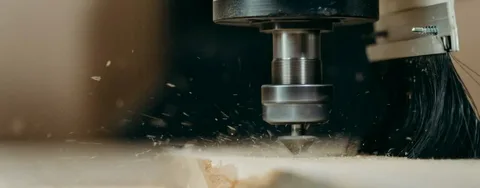Shaping raw materials into functional parts starts with knowing what a CNC machine can handle. Across industries, modern machining services deliver complex components by cutting a wide range of metals, plastics, and composites. Local CNC companies near me are capable of handling more than just metal blocks—they cut materials tailored to the demands of aerospace, medical, energy, and heavy equipment applications.
Aluminum Grades Shaped for Weight-sensitive Mechanical Parts
Aluminum remains a top choice for projects requiring high strength without extra weight. CNC machine shops work with grades like 6061 and 7075 for their excellent machinability and lightweight profile. These alloys are shaped into engine housings, brackets, and enclosures used in everything from robotics to electric vehicles. Machinists can produce intricate designs with minimal tool wear due to the forgiving nature of aluminum.
In industries like automotive or drone manufacturing, weight reduction matters just as much as structural performance. CNC machining provides the precision needed to cut detailed parts without sacrificing integrity. Whether it’s a prototype or full-scale production run, aluminum remains one of the most cost-effective materials a CNC machine company can cut reliably with accuracy and speed.
Stainless Alloys Cut Clean for Corrosion-resistant Components
Stainless steel provides both strength and corrosion resistance, making it a popular material in harsh or sterile environments. Shops with high-end equipment and skilled operators can cut alloys like 304 and 316 stainless with precision, even when tight tolerances are required. The material holds up well during turning, milling, or CNC plasma cutter operations.
Medical equipment, marine hardware, and food-grade machinery all benefit from stainless components. These parts often require smooth finishes and clean edges, which can be achieved with proper tooling and coolant strategies. A machine shop near me will often include stainless parts in their machining services, providing long-lasting performance in chemically exposed applications.
Carbon Steels Machined for Structural and Load-bearing Uses
Carbon steel is well-suited for load-heavy applications like frames, supports, or brackets in construction and manufacturing. Grades such as 1018 and 1045 machine cleanly and hold their form under pressure. Unlike harder steels, carbon alloys offer a balance of machinability and toughness that makes them ideal for forming structural parts.
These steels are commonly processed using both traditional CNC tools and modern CNC plasma cutting machines, depending on part size and material thickness. The heat tolerance and strength of carbon steel make it an everyday material in fabrication jobs where reliability and durability matter most. Cutting and drilling this material is a routine part of most machining services near me.
Hardened Tool Steels Cut for Wear-heavy Industrial Tooling
Tool steels, including A2, D2, and H13, are known for holding an edge under intense friction and heat. Though difficult to cut, these materials are essential for producing molds, dies, and punches. A CNC machine shop near me equipped for high-precision machining uses specialized cutters, high-speed spindles, and thermal control to work with these challenging materials.
The advantage of using tool steel lies in its durability and ability to withstand impact over time. Whether it’s used in stamping dies or extrusion tools, the longevity of parts made from these alloys justifies the added effort in machining. Their use is most common in sectors where tooling takes daily abuse and dimensional accuracy cannot be compromised.
Plastics and Polymers Machined for Non-metallic Assemblies
Thermoplastics like Delrin, PEEK, and UHMW are often selected for their chemical resistance, weight reduction, or electrical insulation. These materials are easy to machine with low-speed cutting tools and sharp edges, producing chips rather than dust. CNC shops use them to create bushings, seals, insulators, and housings for electronics or mechanical systems.
Unlike metals, plastics require attention to heat buildup during machining. Parts can warp or deform if temperatures rise too quickly, so spindle speeds and feed rates are carefully adjusted. CNC companies near me often include plastic cutting in their range of machining services, allowing for lightweight and versatile parts that fit seamlessly into both industrial and consumer-grade assemblies.
Titanium Formed for Aerospace and Medical Applications
Titanium is highly prized for its strength-to-weight ratio and biocompatibility, making it ideal for aerospace brackets or surgical implants. Machining titanium requires rigid setups, slow feed rates, and precise control due to its work-hardening nature. Still, CNC plasma cutters or multi-axis machines can shape this material accurately with the right tools and experience.
The metal’s resistance to corrosion and extreme temperatures gives it an advantage in high-performance settings. While slower to machine than other alloys, titanium delivers unmatched performance in critical components. A CNC machine shop near me with aerospace and medical capabilities will often stock this material for specialized, high-spec parts.
Castings Surfaced and Drilled for Final-fit Assemblies
Cast parts are commonly brought into CNC shops for finishing work, such as facing, drilling, or tapping. These castings, typically made from aluminum, cast iron, or steel alloys, are produced close to net shape and then machined to meet precise dimensional specs. The casting process allows for cost-effective production of complex forms, while CNC machining ensures functionality.
Surface machining corrects inconsistencies from the casting process, while hole placement and threading are handled to tight tolerances. Cast components are often used in engine blocks, valve bodies, or pump housings. A local machine shop near me handles these post-processing tasks with care to preserve the integrity and function of each casting.
Composites Trimmed to Spec for Layered Material Projects
Carbon fiber and fiberglass composites are used where stiffness and low weight are essential. CNC routers or multi-axis machines trim these materials using diamond-coated tools to prevent fraying and delamination. These parts find their way into automotive panels, aerospace structures, and advanced sporting equipment.
Cutting composites involves dust extraction and surface protection techniques. Unlike metals, layered materials can crack or splinter without the right machining approach. CNC companies near me familiar with composite processing offer tailored solutions that ensure clean edges, accurate profiles, and safe handling from prototype to production.



